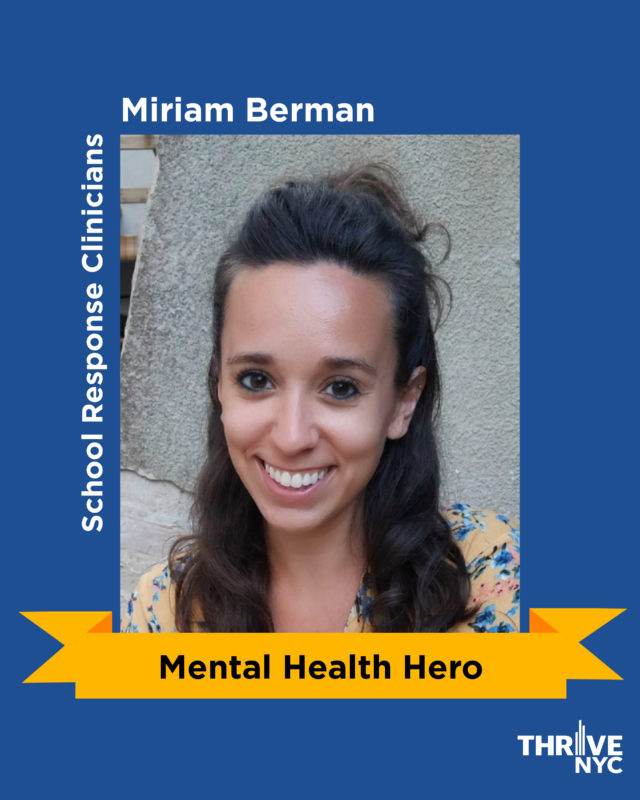School Response Clinicians: Helping students have difficult conversations about loss
 During the COVID-19 pandemic, Miriam Berman has had to reimagine her work as a School Response Clinician (SRC) at New York City public schools. Usually, SRCs provide care for students in times of immediate crisis or emotional distress by providing onsite clinical counseling and connecting students to long-term care. But when the schools shifted to remote learning, that in-person support was impossible to provide.
During the COVID-19 pandemic, Miriam Berman has had to reimagine her work as a School Response Clinician (SRC) at New York City public schools. Usually, SRCs provide care for students in times of immediate crisis or emotional distress by providing onsite clinical counseling and connecting students to long-term care. But when the schools shifted to remote learning, that in-person support was impossible to provide.
Instead of slowing down, Ms. Berman jumped into action. The bulk of Ms. Berman’s remote work with schools involved providing counseling for students who had lost a family member due to COVID-19. She created and ran virtual support groups for staff across many schools.
Ms. Berman also helped develop an easily accessible Google Classroom to connect families to essential resources like food, internet, and tele-mental health services. She began conducting remote counseling sessions to support students and families who were struggling with the ongoing crisis as well as those who were grieving the loss of a relative due to COVID-19.
Knowing that entire school communities were experiencing trauma, Ms. Berman began running virtual support groups and social-emotional learning sessions for teachers and administrators on how to support a whole school – students, families and staff included – during a pandemic. She also created a COVID-19 loss referral form with guiding language so that teachers who were having difficult conversations about grief with students could refer them to an SRC for additional support.
“Navigating relationships virtually can be hard,” said Carmen Villavicencio-Hein, Supervisor of School Social Workers. “Miriam needed to really work on how to allocate supports throughout schools, and also how we would deploy them in a virtual world.”
During the pandemic, Ms. Berman also volunteered to work at the City’s Regional Enrichment Centers for children of essential workers, many of whom were first responders and other key personnel leading the City’s fight against COVID-19. There, she provided student support and implemented a social and emotional curriculum, to help children identify and cope with their feelings while navigating all the new transitions. Ms. Berman knew that first responders needed space to process their own experiences and possible trauma, so she volunteered to co-facilitate groups to support nurses.
“What Miriam did, volunteering and managing the demands of her own position, was huge. She balanced all those things,” said Ms. Villavicencio-Hein.
From Ms. Berman:
“Empowering children with confidence and skills to navigate life’s challenges led me to this work and I’m continuously inspired by the strength and resiliency of our students and families. It’s beautiful to see people come together to support each other through times of crisis.”
Community mental health program: School Response Clinicians
In the beginning of the 2019/2020 school year, the City launched a new partnership between ThriveNYC and DOE: School Response Clinicians, licensed clinical social workers who support students across the city. These social workers provide care to students to prevent crises and in times of immediate emotional distress, provide onsite counseling, and help connect students to long-term care if necessary. During the COVID-19 pandemic, School Response Clinicians offered wellness check-in calls and individual mental health sessions remotely to students in emotional distress or crisis.